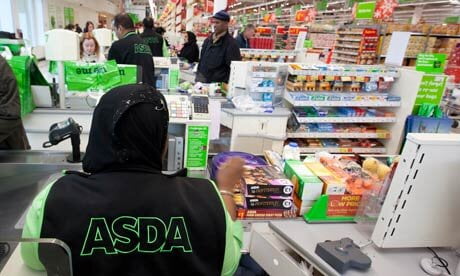Take Andy Clarke, chief executive of Asda, who is worried about the impact of consumer confidence on his business, and said that shoppers at his stores faced a “perfect storm” – with less money to spend, and anxiety about higher costs and fear of unemployment. Sales of National Lottery scratch cards, which correlate to customer anxieties, were rising at Asda. “It shows that customers out there are worried,” said a spokesperson. Concerned that government is not getting the message, Clarke had “personally handed” data from Asda’s income tracker to several frontbench government ministers.
He is not alone in his observations of changing attitudes and behaviour. Pollsters have picked up on these too. One told the Financial Times that while there have been dramatic downward shifts in satisfaction with public services, people “have no clue that it hasn’t happened yet … so they don’t know it is going to get a lot worse”.
He’s wrong. We have got a clue – thanks to regular and irresponsible scaremongering by, among others, George Osborne, the chancellor. Last week he tried hard to talk down the economy by warning that a “hard road” lay ahead and that “our nation was on the verge of bankruptcy”. The British people are not stupid. We have listened to the warnings and can feel in our bones the threat to our livelihoods, even before the economic storm breaks on April 1 – a day some have called “Freaky Friday”.
On that day 15 tax rises and benefit cuts will hit the nation’s pockets. About 330,000 public sector employees are expected to lose their jobs. Another 680,000 people in local authority housing will lose some housing benefit, and possibly their homes. For those lucky enough to keep their jobs, a two-year public sector pay freeze begins – as inflation threatens. On that day, universal child benefit will be frozen at current levels for three years. An estimated 750,000 earners will start paying the higher (40%) rate of tax.
National insurance contributions rise 1%, likely to cost business £1.2bn a year. And that’s not all. The list goes on, and includes effective cuts in pensions and other benefits. There will be some gainers as a result of increases in income tax personal allowance and the NI contributions threshold – but on the whole the changes fully justify the public’s fears and “downward shifts in satisfaction measures”.
Freaky Friday’s hits will come on top of January’s VAT increase to 20%, the 16% rise in oil prices this last month, and a startling 6.3% rise in food prices in the 12 months to January. The British people are wisely hunkering down and snapping their purses shut.
This contraction appears to be the aim of government economic policy. Bad news for Asda’s chief executive; for British manufacturers and other intrepid entrepreneurs. If Asda wins the power to sack workers more easily, that will not help lure more shoppers through Asda’s doors; on the contrary. Cutting “red tape” will do little to help private sector firms, if thanks to government policy real incomes are cut, economic activity shrinks and businesses go bust. There is very little red tape in going bankrupt. And cutting climate change taxes will not help deal with the biggest threat of all.
It’s time that the coalition government, the Treasury, and their supporters in the economics profession turned the telescope the other way around. Looking down the “supply side” lens does little to illuminate or stimulate falling demand.
What the economy needs, as the PM rightly argues, is “rebalancing” – away from financial services and towards those industries that will create the jobs needed to tackle immense, historically unprecedented challenges, like the growing threat of energy, food and climate insecurity. Industries will need government help to make the transition to an economy less dependent on factors such as Middle Eastern oil, Russian wheat and foreign gas supplies. To make that transition, both the private and public sectors will need government backing to create, not destroy, the jobs and economic activity vital to stability and national security.
Without such a major transition, the “perfect storm” of energy and food insecurity coupled with climate change is likely to be more frightening to Asda’s consumers than a George Osborne speech or today’s higher food and fuel costs.
Or even Freaky Friday.





